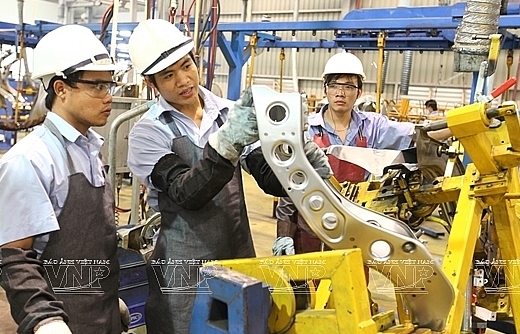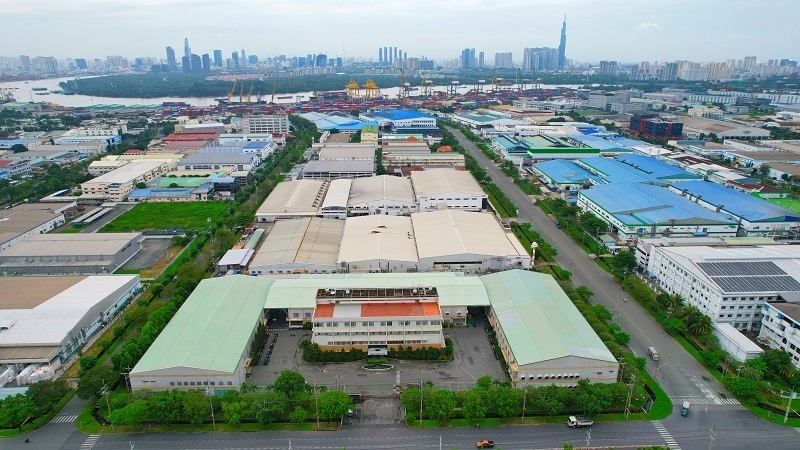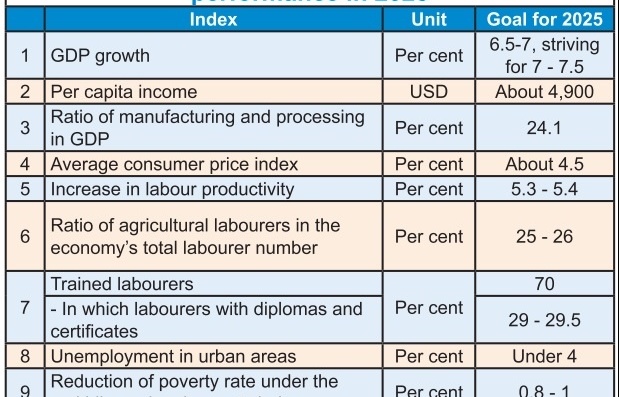How to find the right staff to prosper in 2010
As a large number of small and medium-scaled foreign-invested businesses have been recently established following the Vietnamese economy starting to regain its impressive development pace, hiring the right staff has become an issue.
 Having professional staff is a key building block for company prosperity |
As the Ministry of Planning and Investment’s statistics indicate, most newly-licenced foreign direct investment (FDI) firms in Vietnam are small and medium-scaled. What is your advice to these firms about senior personnel recruitment in Vietnam?
The market is still quite flat in Vietnam now. However, we have seen increasing signals of the economy picking up and for sure there is going to be a period of growth coming again. The question is just, how soon? If the firms have a vision to establish their growth in Vietnam and they doubt when to do it, from my perspectives of hiring people, this is a good time for them to do that.
Because people who are now starting to look for jobs will not ask for extremely high salary but other things. I believe that those firms can now really hire staff at fairly normal prices because if they wait until the economy starts to boom again, people who want to move will ask for a high salary.
As newly-established FDI firms are small and new in the market, they also have their own advantages to offer to their staff who can learn and be taught a lot from their top leaders as there are not many line-managers between them.
Also, their staff can be involved in a broad scope of activities so they can develop in a broad way, which is really meaningful to staffs’ career paths as they can do marketing, sales, human resources and even financing things. Meanwhile, big and multinational companies are more specialised in what one can do.
The fact is that now people are much more alert about job security and their career perspectives instead of looking for high-salary and good opportunities in high-title and fancy jobs. The firms now have to convince potential candidates on the fact that they are committed in Vietnam’s market and have secure position offered to their staff. Job seekers currently have two most important things to bear in mind.
The first is that they are happy with their jobs, with people and the working environment. The second thing is that they can develop and can learn and gain experience after a certain time of working for their companies. So the firms should always try to provide their staff with stability and security for their career path and of course with a nice working environment.
Given the culture, psychology and characteristics of Vietnamese people, do you think salary is the top issue that ensures talent retention?
As I said earlier, focusing on recruitment is important, but talent retention is even more important. We made a lot of surveys asking Vietnamese participants what makes them work in a company and what makes them decide to look for another job.
And the result is interesting that salary is not the reason for most of the participants to look for other jobs but just mind them when they decide to get new jobs as it is very tangible in a job description and job offer. In other words, if people work in the company they like they will stay despite the salary levels. But if their working environment and bosses are not nice and they can’t visualise their career paths then they will look for other jobs with higher salary. Again, the number one reason to retain talented people is good working environment, which is much more important than the salary.
And given the potential Vietnam has as it looks to the future as a developing and emerging country with a nice culture, people and food, there is a growing number of CEO and CFOs who left Vietnam who want to come back and work.
Many of them have recently contacted me to ask about job opportunities with even not favourable salary levels compared to their current jobs. This is very nice for Vietnam as the firms can have more options to hire experienced, committed and affordable staff in the future.
What should foreign bosses bear in mind regarding their relations and behaviour towards Vietnamese senior staff to ensure talent retention, apart from the issues of salary and bonus payments?
For western cultures, giving feedback and criticising bosses are appreciated, but Vietnamese staff don’t usually do that, so we encourage staff to learn that criticism is a good way to grow. We encourage them to take action and make mistakes to be corrected and learn from those mistakes and lessons. We have to explain to them the advantages of observing other people’s behaviour and give feedback to learn from each other.
In some cases, if staff make mistakes and upset clients, that will be okay as the staff can learn from that and will serve our clients better in the future. We think that having good staff will help us have more clients then.
As a boss, I try to adjust to Vietnamese culture and local working professional practices as well. Vietnamese culture is much more indirect than western ones, so Vietnamese staff don’t confront people so much, and they don’t ask to solve problems and to find out the root of the problems. Therefore, don’t force and push things too fast.
Have FDI firms in Vietnam been aggressively expanding their recruitment after the global financial crisis?
I have seen many companies expanding their businesses recently and have also seen some new investments by foreign businesses to build factories in Dong Nai and Binh Duong provinces. Their demand for staff, therefore, is increasing. However, the way they are hiring people sometimes is not professional.
Because they just put advertisements or ask head hunters while their CEOs and/or line-mangers are not very much involved in the recruitment processes. I think first of all the firms have to decide what they want to use and why.
Whether they can use head hunters, advertisements or websites, or self-recruitment, the most important thing is that they should evaluate each source to find out the best source that work to them.
Also, CEOs and line-managers of those firms should be closely supervising and planning recruitment processes to keep human resources teams or involved people updated about any vacancies seen in the firms.
From a recruitment company’s perspectives, the firms should create chances for their assigned head hunters to tour their offices and/or production bases where future candidates will work so that the head hunters can have better perception about who they are going to recruit to better meet their client’s recruitment inquiries.
What the stars mean:
★ Poor ★ ★ Promising ★★★ Good ★★★★ Very good ★★★★★ Exceptional
Related Contents
Latest News
More News
- Mitsubishi Estate launches Logicross Hai Phong - a milestone in logistics evolution (November 20, 2024 | 14:32)
- Semiconductor workforce partnerships deliver industry-relevant training (November 20, 2024 | 10:58)
- German Quickpack to invest $31.7 million in Long An province (November 20, 2024 | 09:31)
- Foreign-invested enterprises drive logistics investment in the southeast region (November 20, 2024 | 09:27)
- Chile visit underscores trade benefits (November 19, 2024 | 10:00)
- Trump’s second term impacts sci-tech activities and industry 4.0 technologies (November 18, 2024 | 10:00)
- Vietnam eyes nuclear revival to bolster energy security (November 14, 2024 | 16:46)
- Kyokuyo completes $13.5 million seafood factory in Vietnam (November 14, 2024 | 12:19)
- VinFast receives $3.5 billion funding from Vingroup and Pham Nhat Vuong (November 14, 2024 | 06:38)
- Localities sprint to reach FDI targets (November 13, 2024 | 10:00)


 Tag:
Tag:

















 Mobile Version
Mobile Version